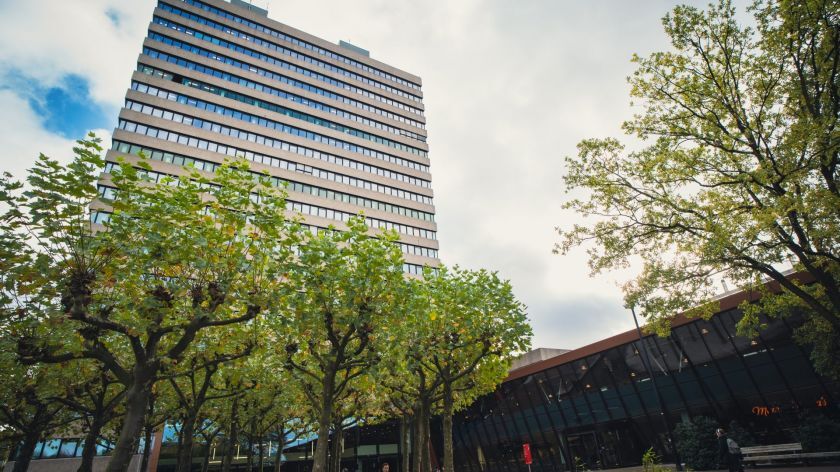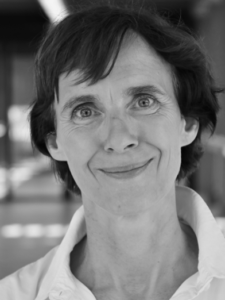The Faculty of Arts recruits abroad to address the teacher shortage
-
 The Erasmusbuilding. Photo: Johannes Fiebig
The Erasmusbuilding. Photo: Johannes Fiebig
For language studies, the faculty is targeting prospective students in Germany and France. Several other programs have also been cleared to recruit internationally, with one of the main goals being to help reduce the teacher shortage.
The Faculty of Humanities will start recruiting internationally again from 2025. The faculty has received approval from the university’s executive board, provided that the programs in question help address gaps in the Dutch job market.
This applies to the Dutch, French, and German language programs, Dean Paula Fikkert explains. ‘The long-term Sector Plans (government-funded long-term initiatives for education and research, ed.) indicate a chronic shortage of students in these fields, and stress the need for a better transition to teacher training programs.’
Despite various campaigns to attract more students, language studies in the Netherlands have struggled to enrol enough candidates for years. Meanwhile, in Germany, many students do pursue teacher training for Dutch, Fikkert notes. ‘It’s a bit ironic,’ she says. ‘These students – often bilingual Germans living near the border – are exactly the kind we would like to attract to Nijmegen.’
Germany and France
The Faculty of Arts also plans to recruit German students in Goethe and Schiller’s homeland, focusing on universities that already offer Dutch studies. The logic is that these students have a connection to the Netherlands and already speak the language. ‘They can gain academic expertise here, then go on to teacher training and, hopefully, work as teachers in the Netherlands.’
Recruiting French students for the French program presents more of a challenge, given that Nijmegen doesn’t border France. The faculty plans to use a similar strategy as with German: targeting universities in France where Dutch is taught.
Scholarships
It may be surprising that the Faculty of Arts is allowed to recruit internationally. Earlier this year, Dutch universities agreed to halt recruitment at international fairs following a request from former Minister of Education, Robbert Dijkgraaf, to limit the influx of international students. As a result, the Faculty of Arts currently has fewer international students than in previous years. ‘Enrolment numbers for most English-taught bachelor’s programs have dropped,’ Fikkert says.
‘We see it as our responsibility to motivate language students to continue on to teacher training programs.’
An exception has been made for programs facing significant labor market shortages. ‘This is why we see it as our responsibility to encourage students in language studies to pursue teacher training afterward. We can’t mandate it, but we can certainly promote it. A large national campaign aimed at reducing the teacher shortage is also set to launch soon.’
International Classroom
In addition to language studies, the Faculty of Arts has been granted permission to recruit internationally for the educational master’s programs, as well as for English Language and Culture, American Studies, Arts & Culture Studies, and Comparative European History. ‘An international classroom broadens the scope and appeal of these programs,’ says Fikkert. The same applies to the master’s programs in Linguistics. ‘We also have courses where heritage and artificial intelligence play a key role, both of which are in high demand in the labor market.’
Radboud University will focus its search on countries where interest in these programs is already evident. Last year, Germany, Italy, and Greece topped the target list for the Faculty of Arts, followed by Bulgaria, Estonia, Latvia, Lithuania, Belgium, and Spain. Outside the EU, China, Taiwan, Turkey, and Indonesia were the leading countries. By 2025, recruitment will once again take place in person at fairs. When targeting students from specific universities, recruitment can also be conducted via email.
‘We are fully prepared to train international students for the Dutch job market.’
The goal, according to Fikkert, is for future international students to also become proficient in Dutch. ‘We already offer Social Dutch courses, and students can take additional courses through Radboud in’to Languages. We are fully prepared to equip international students for the Dutch job market, but of course, it remains to be seen whether they will actually end up working here.’
Translated by Lieke Stevens




